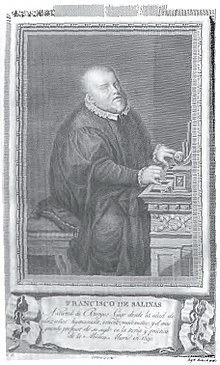
Francisco de Salinas (1513, Burgos – 1590, Salamanca) was a Spanish music theorist and organist, noted as among the first to describe meantone temperament in mathematically precise terms, and one of the first (along with Guillaume Costeley) to describe, in effect, 19 equal temperament. In his De musica libri septem of 1577 he discusses 1/3-, 1/4- and 2/7-comma meantone tunings. Of 1/3-comma meantone, which is essentially identical to the meantone of 19-et, he remarks that it is "languid" but not "offensive to the ear", and he notes that a keyboard of 19 tones to the octave suffices to give a circulating version of meantone.
The 19th-century musicologist Alexander John Ellis maintained that Salinas really meant to characterize 1/6-comma meantone, and made a mistake due to his blindness. Others point out that Salinas's descriptions of his tuning as "languid" but not "offensive to the ear" seem to apply to 1/3-comma meantone, not to 1/6-comma meantone, which in any case has a much sharper fifth than musicians of Salinas's own time preferred.
Salinas was also interested in just intonation, and advocated a 5-limit just intonation scale of 24 notes he called instrumentum perfectum.